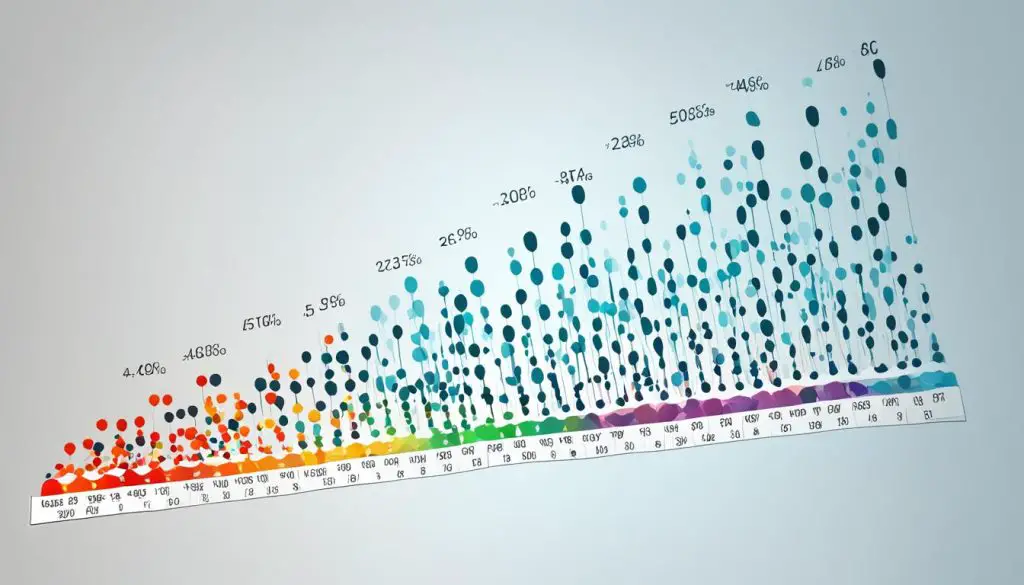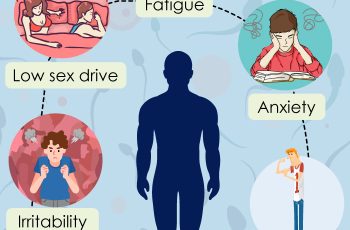Ad Blocker Detected
Our website is made possible by displaying online advertisements to our visitors. Please consider supporting us by disabling your ad blocker.
Testosterone is a hormone produced by both men and women and plays a crucial role in various aspects of health. It is important to understand the average testosterone levels by age to have a better understanding of what is considered normal. The level of testosterone can vary throughout life, and doctors assess it through a blood test. The normal ranges for testosterone levels depend on the age and gender of an individual. It is essential to note that these are ranges, and it is not necessary to aim for the high end of the spectrum.
Understanding Testosterone Levels
Testosterone is present in the womb and is vital for normal fetal development. Throughout life, the testosterone level in boys and men changes, and there is a range considered normal by doctors. Understanding and assessing testosterone levels is crucial for maintaining optimal health.
“Testosterone is the key hormone for masculine characteristics, responsible for deepening of the voice, muscle growth, and sexual development. However, it is also present in women, although in smaller amounts,”
Doctors assess testosterone levels through a blood test, which measures the hormone concentration in nanograms per deciliter (ng/dL). This assessment allows them to determine whether an individual’s testosterone levels fall within the normal range.
It is important to understand testosterone levels for several reasons:
- Optimal health: Maintaining testosterone levels within the normal range is essential for overall well-being.
- Sexual function: Testosterone contributes to sexual desire and performance in both men and women.
- Muscle mass and strength: Adequate testosterone levels support muscle growth and strength.
- Bone density: Testosterone plays a role in maintaining bone density and preventing osteoporosis.
- Mental well-being: Testosterone affects mood, energy levels, and cognitive function.
By assessing testosterone levels, doctors can evaluate an individual’s hormonal balance and customize treatment plans if necessary. This helps ensure that any underlying hormonal imbalances are addressed appropriately to promote optimal health and well-being.
Average Testosterone Levels by Age
Testosterone levels can vary depending on age and gender. Many individuals have questions about what the average testosterone level should be at a certain age. It is important to understand that these levels are presented as ranges, and the goal should not necessarily be to reach or exceed the high end of the spectrum. Here are some specific testosterone level ranges for different age groups:
- Normal testosterone level in male babies: 75-400 ng/dL
- Normal testosterone level in boys aged 10: 7-130 ng/dL
- Normal testosterone level in boys aged 12-13: 7-800 ng/dL
- Normal testosterone level in teen boys aged 15-16: 100-1,200 ng/dL
- Normal testosterone level in adults aged 19 and older: 300-1,000 ng/dL
It is important to note that these ranges are provided as guidelines and may vary from individual to individual. If you have concerns about your testosterone levels, it is best to consult with a healthcare professional who can provide appropriate guidance and monitoring.
How Testosterone Levels Change with Age
As you age, your testosterone levels naturally decrease. According to a study published in the Journal of Clinical Endocrinology & Metabolism, the average testosterone levels in men decrease by about 1% per year after the age of 30. However, this decline can vary among individuals.
It’s important to note that testosterone levels can fluctuate throughout the day, with the highest levels usually seen in the morning. Additionally, various factors such as stress, diet, exercise, and overall health can affect testosterone levels.

Monitoring and maintaining optimal testosterone levels are essential for overall health and well-being. If you suspect that you have low testosterone or have concerns about your levels, it is recommended to discuss them with your healthcare provider. They can provide appropriate testing, guidance on natural ways to increase testosterone, and recommend treatment options if necessary.
Low T Symptoms
Low testosterone (Low T) can lead to a variety of physical and emotional symptoms. It is important to recognize these symptoms and seek medical advice if you experience them. Some common symptoms of low testosterone include:
- Decreased sex drive: A decrease in sexual desire or interest.
- Decreased frequency and quality of erections: Difficulty achieving or maintaining satisfactory erections.
- Reduced muscle mass and strength: a notable decrease in muscle mass and strength.
- Low energy or fatigue: Feeling constantly tired or lacking energy.
- Decreased bone density: Weakening of the bones, which increases the risk of fractures.
- Feeling depressed: A persistent feeling of sadness or loss of interest in activities.
If you are experiencing any of these symptoms, it is essential to discuss them with your doctor. They can help determine if low testosterone is the cause and recommend appropriate treatment options.

Women and Testosterone Levels
Although testosterone is often associated with men, women also require appropriate levels of this hormone for optimal health. As women go through menopause and their estrogen levels decrease, it can affect the delicate balance between estrogen and testosterone in their bodies. Consequently, high testosterone levels or imbalances in women can lead to various symptoms and health concerns.
High testosterone levels in women can manifest in several ways, including:
- Acne
- Hair loss on the head
- Facial hair growth
- Irregular periods
- Infertility
If you experience any of these symptoms or have concerns about your testosterone levels, it is crucial to discuss them with your doctor. Your doctor can order testing to assess your testosterone levels and provide appropriate treatment options if necessary.
Remember, maintaining a balanced hormonal profile is essential for your overall well-being. By addressing any imbalances and working with your healthcare provider, you can optimize your testosterone levels and promote better health.
Speak to your doctor today to address any concerns you may have regarding testosterone levels in women and find the right solutions to maintain optimal hormonal health.
Talk with Your Doctor
If you suspect that you have low testosterone or have concerns about your testosterone levels, it is important to talk with your primary care physician. They can provide guidance on natural ways to address low testosterone, such as through exercise (Source: Mayo Clinic). Additionally, they can discuss the option of testosterone replacement therapy if necessary (Source: Healthline).
“Having an open and honest conversation with your doctor about your testosterone levels is the first step towards finding a solution. They can provide the expertise and guidance needed to assess your situation and develop a personalized treatment plan that’s right for you.”
If your primary care physician determines that you require specialized care, they may refer you to a specialist who specializes in hormone management, such as a urologist. These specialists have extensive knowledge and experience in addressing low testosterone and can provide you with further guidance and treatment options. Finding a doctor who specializes in testosterone replacement therapy is crucial in ensuring that you receive the most appropriate care for your specific needs.
| Finding a Doctor | Specialist Type | Website/Phone Number |
|---|---|---|
| ABC Endocrinology | Endocrinologist | www.abcendocrinology.com (123) 456-7890 |
| XYZ Urology Clinic | Urologist | www.xyzurologyclinic.com (555) 123-4567 |
| PQR Hormone Center | Hormone Specialist | www.pqrhormonecenter.com (987) 654-3210 |
Remember, open communication with your doctor is crucial in addressing any concerns or symptoms related to low testosterone. They will help guide you through the appropriate steps to take and ensure that you receive the necessary care to optimize your hormone levels and overall health.

Conclusion
Understanding the average testosterone levels by age is essential for maintaining optimal hormonal balance and overall health. It is important to note that testosterone levels can vary throughout life, and there is a range considered normal for each age group. If you have concerns about your testosterone levels or experience symptoms related to low testosterone, it is recommended to have a discussion with your healthcare provider.
Your healthcare provider can offer guidance on natural ways to increase testosterone, such as through regular exercise. They can also order appropriate testing to assess your testosterone levels and provide personalized recommendations or treatment options if necessary. By working closely with your healthcare provider, you can take proactive steps to maintain optimal hormone balance and support your overall well-being.
Remember, maintaining optimal testosterone levels is crucial for both men and women. By prioritizing your hormonal health, you can enhance your energy levels, libido, muscle mass, bone density, and overall quality of life. Don’t hesitate to reach out to your healthcare provider and address any concerns you may have related to testosterone levels. With their expertise and support, you can achieve and maintain optimal hormonal balance for a healthier, happier you.
FAQ
What are the average testosterone levels by age?
Testosterone levels can vary depending on age and gender. Here are some average testosterone levels by age: for male babies, 75-400 ng/dL; boys aged 10, 7-130 ng/dL; boys aged 12-13, 7-800 ng/dL; teen boys aged 15-16, 100-1,200 ng/dL; adults aged 19 and older, 300-1,000 ng/dL.
What are the symptoms of low testosterone?
Symptoms of low testosterone, also known as Low T, can include decreased sex drive, decreased frequency and quality of erections, reduced muscle mass and strength, low energy or fatigue, decreased bone density, and feeling depressed.
Do women have testosterone levels?
Yes, women also have testosterone levels. As women enter menopause, their estrogen levels decrease, which affects the balance of estrogen and testosterone in the body. Hormonal imbalances or high testosterone levels in women can cause symptoms such as acne, hair loss on the head, facial hair growth, irregular periods, and infertility.
What should I do if I suspect low testosterone?
If you suspect low testosterone or have concerns about your testosterone levels, it is important to talk with your primary care physician. They can provide guidance on natural ways to increase testosterone, such as through exercise, and discuss the option of testosterone replacement therapy if necessary.
How can I address low testosterone?
The first step in addressing low testosterone is to talk to your doctor, who can guide you through the process. They may recommend lifestyle changes, such as exercise and weight management, or prescribe testosterone replacement therapy if necessary. It is important to have open communication with your doctor to address any concerns or symptoms related to testosterone levels.
How do I find a doctor who specializes in testosterone therapy?
If you are considering testosterone replacement therapy, your primary care physician can refer you to a specialist, such as a urologist or an endocrinologist, who can provide expertise in this area.
Why is maintaining optimal hormonal balance important?
Maintaining optimal hormonal balance, including testosterone levels, is crucial for overall health and well-being. Hormones play a vital role in various aspects of health, including sexual function, muscle mass and strength, bone density, mood, and energy levels. Regular monitoring and appropriate management of testosterone levels can help individuals maintain their overall health and vitality.
Does Testosterone Level Affect Alpha Male Characteristics?
Testosterone level plays a significant role in understanding alpha male explained. Higher testosterone levels can contribute to assertiveness, confidence, and dominance, all of which are common characteristics associated with an alpha male. However, it’s important to note that other factors also influence one’s alpha male characteristics.
Source Links
- https://www.baptisthealth.com/blog/mens-health/normal-testosterone-levels-by-age
- https://medicine.umich.edu/sites/default/files/content/downloads/What Is a Normal Testosterone Level for Young Men Rethinking the 300 ngdL Cutoff for Testosterone Deficiency in Men 20-44 Years Old.pdf
- https://www.medicalnewstoday.com/articles/323085


